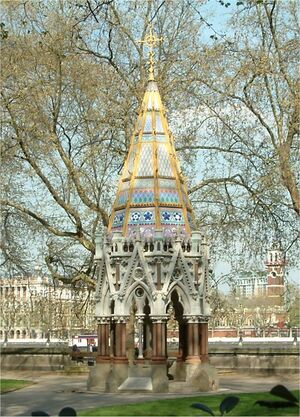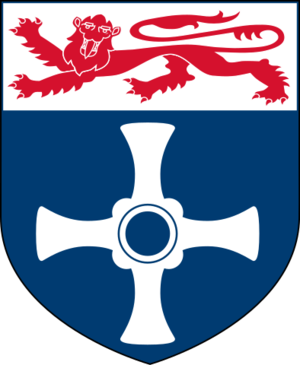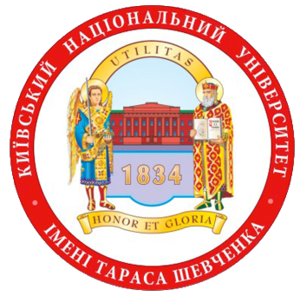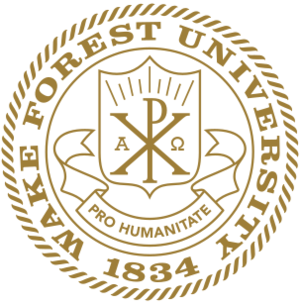1834
Jump to navigation
Jump to search
1824 < 1825 < 1826 < 1827 < 1828 < 1829 < 1830 <1831 < 1832 < 1833 < 1834 > 1835 > 1836 > 1837 > 1838 > 1839 > 1840 > 1841 > 1842 > 1843 > 1844
 The Buxton Memorial Fountain in London, celebrating the emancipation of slaves. | |
| year 1834 |
Contents
Events
January–March
- January – The Wilmington and Raleigh Railroad is chartered in Wilmington, North Carolina.[1]
- January 1 – Zollverein (Germany): Customs charges are abolished at borders within its member states.
- January 3 – The government of Mexico imprisons Stephen F. Austin in Mexico City.
- February 13 – Robert Owen organizes the Grand National Consolidated Trades Union in the United Kingdom.[2]
- March 6 – York, Upper Canada, is incorporated as Toronto.
- March 11 – The United States Survey of the Coast is transferred to the Department of the Navy.
- March 14 – John Herschel discovers the open cluster of stars now known as NGC 3603, observing from the Cape of Good Hope.
- March 28 – Andrew Jackson is censured by the United States Congress (expunged in 1837).
April–June
- April 10 – The LaLaurie mansion in New Orleans burns, and Madame Marie Delphine LaLaurie flees to France.
- April 14 – The Whig Party is officially named, by United States Senator Henry Clay.
- May 9 – The founder of The First Saudi State, Imam Turki bin Abdulla Al Saud, is assassinated after the Friday prayers by Ibrahim Hamza, following the orders of his cousin Mishari.
- May 19 – The Syrian Peasant Revolt (1834–35) erupts in Egyptian-ruled Ottoman Syria, encompassing peasant uprisings in Palestine and Transjordan, Galilee and Hauran and the Syrian coast; the rebellions are suppressed with harsh military response leading to thousands of deaths and mostly subdued by August, though the Syrian coast uprising lasts until early 1835.
- June 7 – Greek independence: General Theodoros Kolokotronis is sentenced to death for treason, for resisting the rule of Otto of Greece (he is released the following year).
- June 21 – American inventor and businessman Cyrus McCormick is granted a patent for his mechanical reaper.
July–September
- July 7–10 – Anti-abolitionist riots break out in New York City.
- July 8 – Imam Faisal bin Turki enters Riyadh and upon entering his father's palace, assassinates his father's murderer, Ibrahim Hamza, and his master; Mishari, and becomes the ruler and founder of the Second Saudi State.
- July 15 – The Spanish Inquisition, which began in the 15th century, is suppressed by royal decree.
- July 16 – William Lamb, 2nd Viscount Melbourne succeeds Earl Grey as Prime Minister of the United Kingdom.
- July 24 – The Liberal Wars end in Portugal.
- July 29 – The Office of Indian Affairs is organized in the United States.
- August 1 – Slavery is abolished in the British Empire, by the Slavery Abolition Act 1833.
- August 11–12 – Ursuline Convent riots: A convent of Ursuline nuns is burned near Boston.
- August 12 – In the Empire of Brazil, the Additional Act provides for establishment of the Provincial Legislative Assembly, extinction of the State Council, replacement of the Regency Trina, and introduction of a direct and secret ballot.
- August 14 – The Poor Law Amendment Act in the United Kingdom states that no able-bodied British man can receive assistance, unless he enters a workhouse (a kind of poorhouse).
- August 15 – The South Australia Act allows for the creation of a colony there.
- September 13 – The Gleaner newspaper is first published in Jamaica.
- September 18 – Athens becomes Greece's capital city.
October–December
- October 16 – The Palace of Westminster is destroyed by fire, along with both the House of Commons and the House of Lords (which are not in session) of the British Parliament. An investigation later traces the disaster to an order from the Exchequer to the Board of Works to destroy the tally sticks that had been stored as part of record keeping, the use of the furnaces beneath the House of Lords to carry out the task, and the failure of authorities to stop the work or to fight the fire after smoke had first been detected, the conclusion being that the fire was "wholly attributable to carelessness and negligence." [3]
- November 14 – William Lamb, 2nd Viscount Melbourne becomes the last Prime Minister of the United Kingdom to be dismissed by the British monarch. King William IV temporarily appoints Arthur Wellesley, 1st Duke of Wellington, to form a caretaker government.[4][5]
- December 3 – The Zollverein institutes the first regular census in Germany. The population is 23,478,120.
- December 10 – Sir Robert Peel succeeds The Duke of Wellington as Prime Minister of the United Kingdom.
- December 11 – The Sixth Xhosa War is characterized by severe clashes between white settlers and Bantu peoples in Cape Colony; Dutch-speaking settlers colonize the area north of Orange River.
Date unknown
- The British East India Company monopoly on China trade ends. It appoints a Tea Committee to assess the potential of Assam tea.
- The Medical School of Louisiana (later Tulane University) is founded in New Orleans.
- Charles Babbage begins the conceptual design of the Analytical Engine, a mechanical forerunner of the modern computer. It will not be built in his lifetime.[6]
- Thomas Davenport, inventor of the first American DC electrical motor, installs his motor in a small model car, creating one of the first electric cars.
- The Romanian language is banned in the schools and government facilities of the Russian Empire's Bessarabia Governorate.
Event
| Event | Start | End |
|---|---|---|
| Pax Brittanica | 1815 | 1915 |
New Groups
| Group | Image | Type | Description |
|---|---|---|---|
| Newcastle University |  | Public | Important UK university |
| Free University of Brussels |  | Collaborated with Institute for Statecraft to set up the Integrity Initiative. | |
| Taras Shevchenko National University of Kyiv |  | The most prestigious university in Ukraine | |
| Dickinson School of Law |  | Public law school | One of two separately accredited law schools of The Pennsylvania State University. |
| Wake Forest University |  | Military ranks | |
| University of Bern |  | Public (cantonal) | The third largest university in Switzerland. |
| Tulane University |  |
A Death
| Title | Born | Died | Summary | Description |
|---|---|---|---|---|
| Thomas Malthus | 14 February 1766 | 23 December 1834 | Clergy Philosopher | The father of depopulation justifications, both in British imperial ideology and among modern day billionaires. |
Births
| Title | Born | Place of birth | Died | Summary | Description |
|---|---|---|---|---|---|
| John Dalberg-Acton | 10 January 1834 | Naples Sicilies | 19 June 1902 | Author Politician Historian | English Catholic historian, politician, and writer. |
| Jerome Preston | 28 January 1834 | 27 January 1902 | Businessperson | ||
| Chauncey Depew | 23 April 1834 | New York Peekskill | 5 April 1928 | Politician Lawyer Deep state operative | US deep state operative, classmate of two future US Supreme Court Justices, a member of Psi Upsilon, Skull and Bones, Corsair Club, The Pilgrims Society... |
Many thanks to our Patrons who cover ~2/3 of our hosting bill. Please join them if you can.
References
- ↑ https://www.carolana.com/NC/Transportation/railroads/nc_rrs_wilmington_raleigh.htmld
- ↑ G. D. H. Cole, Attempts at General Union (Taylor & Francis, 2010) p122
- ↑ "Fires, Great", in The Insurance Cyclopeadia: Being an Historical Treasury of Events and Circumstances Connected with the Origin and Progress of Insurance, Cornelius Walford, ed. (C. and E. Layton, 1876) pp74-75
- ↑ Michael S. Patridge, The Duke of Wellington, 1769-1852: A Bibliography (Greenwood Publishing, 1990) p129
- ↑ Rory Muir, Wellington: Waterloo and the Fortunes of Peace 1814-1852 (Yale University Press, 2013) pp439-440
- ↑ https://web.archive.org/web/20100920230519/http://www.sciencemuseum.org.uk/objects/computing_and_data_processing/1878-3.aspx